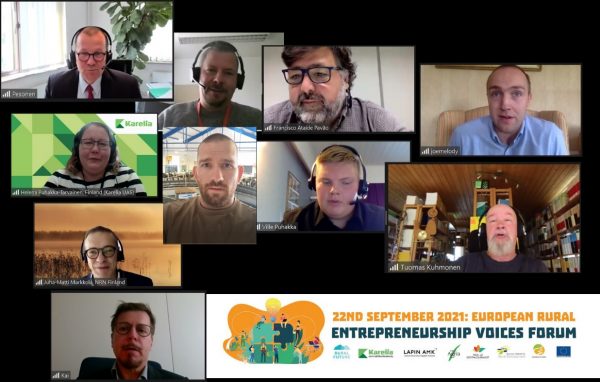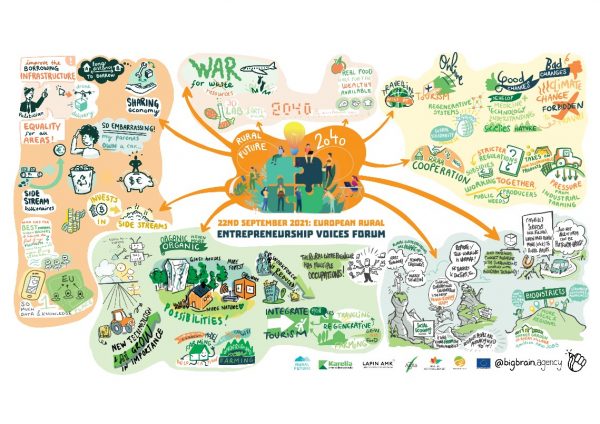Reeta Sipola, M.Nat.Res., Project manager, Future Bioeconomy expertise group, Lapland University of Applied Sciences
Helena Puhakka-Tarvainen, M.Sc., Senior Project Manager, Karelia University of Applied Sciences
The EU’s new Rural 2040 strategy challenges rural areas across Europe to discuss the future
In June 2021, the European Commission published a long-term vision for the EU’s rural areas. The vision is a European Commission initiative to develop a common European rural policy for 2040. It both identifies the challenges facing the rural regions and presents alternative opportunities available to them. The vision is based on foresight work and extensive consultations with citizens and other actors in rural areas. The vision proposes a Rural Pact and a Rural Action Plan to make the EU’s rural areas stronger, more networked, more resilient, and more prosperous in the future.
Long-term joint plans are needed to successfully address the challenges posed by megatrends such as globalization and urbanization and to reap the benefits of the green and digital transition. More than 80% of the European Union’s territory is rural and is home to almost 30% of the population (137 million people). The rural areas are undergoing a major transformation, both economically and socially. The population of rural areas across the EU is, on average, older than that of urban areas and will start to decline in the next decade. Compared to urban areas, challenges also include lack of connections and various employment opportunities, underdeveloped infrastructure, and limited public transport, schools, hospitals, shops, and other services. These factors that affect everyday life can make the countryside a less attractive place to live and work.
However, rural areas are active players in the EU’s green and digital transition and will continue to have an important role in the future in food production. Achieving the EU’s 2030 digital targets can provide new opportunities for sustainable rural development beyond the agricultural and forestry sectors, create new prospects for the growth of the manufacturing industry and in particular services, and equalize the geographical distribution of services and industries.
The EU’s long-term vision for rural areas seeks to address these challenges and concerns by taking advantage of the new opportunities and lessons learned from the EU’s green and digital transition in the covid-19 pandemic. The aim is to identify ways to improve the quality of life in rural areas, achieve balanced regional development and boost economic growth. (Euroopan komissio 2021), (European Commission 2021A).
Stronger, connected, resilient and prosperous EU rural areas
Creating a long-term broad vision has been an extensive collaboration. The European Rural Development Network has been closely involved in creating the vision and engaging different actors and citizens in the process. In Finland, the creation of the vision has utilized the rural 2030 future work and workshops prepared in the spring of 2018, in which the participants have been involved in shaping the vision. (Maaseutuverkosto 2021).
The overall goal has been to create a strong vision that represents the entire rural areas. The Rural 2040 Vision and Action Plan recognize four key areas for targeting development measures:
– Stronger: focus on empowering rural communities, improving access to services, and facilitating social innovation;
– Connected: to improve connectivity both in terms of transport and digital access;
– Resilient: preserving natural resources and greening farming activities to counter climate change while also ensuring social resilience through offering access to training courses and diverse quality job opportunities;
– Prosperous: to diversify economic activities and improve the added value of farming and agri-food activities and agri-tourism. (European Commission 2021B).
Now that the vision has been created, an important phase is about to begin. Practical solutions need to be found to make the vision a reality. Towards the end of the year 2021, The European Commission and the Committee of the Regions will seek solutions to achieve the goals of the vision. This means that there must continue to be a joint debate with regional actors to find the best solutions in each region.
For peripheral regions such as Lapland and North Karelia, Finland, it is important to highlight their perspectives in aligning future development measures. These areas have found common goals in the Rural Future project co-funded by the EAFRD, which aims to inspire rural entrepreneurs to develop their business so that it becomes profitable and attractive in the future as well. The project recognizes that the business environment and markets have changed both locally and globally, and that rural businesses need to be able to innovate and find their place in the changing countryside.
The Rural Future project aims to strengthen the profitability and operating conditions of rural enterprises. The aim is to open up new perspectives for the development of production and operations for rural enterprises and to increase their skills to meet the challenges of the future. Many companies are in a situation where finding new forms of earning is necessary to enable them to make a living and develop their operations.
Karelia University of Applied Sciences, Lapland University of Applied Sciences, Pro Agria Eastern Finland, and Pro Agria Lapland have jointly implemented the Rural Future project in the period 2018-2021 and organized various trainings, study trips, and future path work related to the development of entrepreneurship for the stakeholders. Due to the pandemic, the project has not been able to network entrepreneurs to Europe as extensively as planned in the project proposal. Thus, the project has been forced to develop online activities instead. The last major joint effort of the project has been to organize the European Rural Entrepreneurship Voices Forum with the support of an extensive cooperation network.
Listening to the Voices of Rural Entrepreneurs
The European Rural Entrepreneurship Voices Forum on 22nd September 2021 aimed to open a debate on the future of rural entrepreneurship based on the framework created by the Rural 2040 vision. The focus of the forum was especially to hear the voices of rural entrepreneurs across Europe facing similar challenges and opportunities than the organizing regions North Karelia and Lapland in Finland. The Forum was attended by more than a hundred participants from 20 European countries. It was organized by the above-mentioned Rural Future EU project in cooperation with the Rural Network Support Unit of Finland. Recording of the event and materials will be available soon on the website at https://ruralfuture.karelia.fi/.
The interactive online event included high-level keynote presentations from Dr. Tuomas Kuhmonen, Research Director, Finland Futures Research Centre /Ruralization project, Mr. Pekka Pesonen, Secretary-General at Copa and Cogeca, and Mr. Kai Heikkilä, Senior Expert, European Commission. These experts opened up perspectives on Rural Vision strategy work and the development of rural value chains. The special guest of the event was Mr. Ari Vatanen, Farmer and former MEP both for Finland and France.

Picture 1. European Rural Voices Forum brought together experts and entrepreneurs to vision the future for European rural areas.
As greetings to rural entrepreneurs, the event featured short video presentations from entrepreneurs across Europe. In addition to this, the entrepreneurs themselves were present to participate in an interesting panel discussion where they talked more about their company and ideas for the future.
The event also included a workshop section, in which six parallel thematic workshops envisioned the rural areas of the future from different perspectives. European stakeholder participants worked together to contribute to the long-term vision for the future of EU rural areas. The themes of the workshops were: Organic Farming, Smart Farming, Circular Economy, Rural Tourism, Food Chain, and Peripheral Possibilities. The group facilitators represented international expert organizations involved in rural development. As an innovative side activity to the workshop, there were Tweets from the future, which were produced in each group with tags #tweetfromfuture, #RuralFuture2040, and #RuralvisionEU.
As a result of the workshop discussion, each thematic group presented an illustration of their key reflections, made by live scribers during the workshop session. Since the event, the working group of the Rural Future project has continued to work on the thematic information and, based on it, has compiled a joint picture of the main themes.

Picture 2. Conclusion of the Rural Voices Forum workshops thematic sessions.
Key issues raised during the day included, for example, a broad common concern about the adequacy of the workforce in future rural businesses, and also on the resources in general. On the other hand, the development of new technological solutions was seen as an opportunity if the associated security threats could be minimized so that hackers could not compromise food production. The workshops discussed the development of new types of farming methods, including e.g. vertical farming and the relocation of rural businesses to completely new environments, such as underground. Opportunities were also seen for the spread of several different farming concepts, such as biodistricts. Discussions anticipated changes in tourism and attitudes towards tourism in the future, and its implications for the countryside, e.g., opportunities for developing agrotourism.
The importance of co-operation and community spirit came fore repeatedly in the discussions. The development of new types of business models requires co-operation between different sectors. It was also seen that in the future, entrepreneurship in rural areas will often be multidisciplinary and the sources of income will not come from just one type of activity.
Based on the feedback received so far, the European Rural Entrepreneurship Voices Forum has succeeded in opening a debate on the implementation of the Rural 2040 Strategy. This collaborative event was an important discussion opener, and more work is needed in all European countries to determine what the vision means in practice and what prospects it has for the practical operation of different areas in the future. Implementing the vision needs an action plan to support it. Measures such as the Forum will continue to be needed to internalize the future concept and entity, in order to involve as many actors as possible from different parts of the rural area.
References
Euroopan komissio 2021. Pitkän aikavälin visio: vahvemmat, verkottuneet, selviytymiskykyiset ja vauraat maaseutualueet. Ref. 6.10.2021. https://ec.europa.eu/regional_policy/fi/newsroom/news/2021/06/30-06-2021-long-term-vision-for-rural-areas-for-stronger-connected-resilient-prosperous-eu-rural-areas
European Commission 2021A. A long-term vision for the EU’s rural areas. Ref. 6.10.2021. https://ec.europa.eu/info/strategy/priorities-2019-2024/new-push-european-democracy/long-term-vision-rural-areas_en#avisionforruralareastowards2040
European Commission 2021B. Long-term vision for rural areas: for stronger, connected, resilient, prosperous EU rural areas. Ref. 6.10.2021. https://ec.europa.eu/commission/presscorner/detail/en/IP_21_3162
Maaseutuverkosto 2021.Maaseutu 2040. Ref. 7.10.2021. https://www.maaseutu.fi/maaseutuverkosto/teemat/maaseutu2040-tulevaisuustyo
Keywords: rural areas, rural economy, entrepreneurship, future